 Philosophy can play an important role in our schools’ curriculum. The question might be asked, “Why would anyone want to teach philosophy to pre-adolescent children?” but there are very good reasons why one might want to take on such a lofty task. I am not suggesting that the history of philosophy would be particularly pertinent for a young child to learn, but there is substantial evidence to support the development of an already natural tendency towards philosophical thought. Some may think that the pre-adolescents haven’t got the cognitive developmental ability to wrap their minds around such an elusive and subjective study as philosophy. However, developing this skill has shown long term positive effects. These effects range from developing critical thinking skills and cognitive ability to raising emotional maturity and encouraging the child’s sense of security within his or her world.
Philosophy can play an important role in our schools’ curriculum. The question might be asked, “Why would anyone want to teach philosophy to pre-adolescent children?” but there are very good reasons why one might want to take on such a lofty task. I am not suggesting that the history of philosophy would be particularly pertinent for a young child to learn, but there is substantial evidence to support the development of an already natural tendency towards philosophical thought. Some may think that the pre-adolescents haven’t got the cognitive developmental ability to wrap their minds around such an elusive and subjective study as philosophy. However, developing this skill has shown long term positive effects. These effects range from developing critical thinking skills and cognitive ability to raising emotional maturity and encouraging the child’s sense of security within his or her world.
For years there has been an emphasis on cognitive and physical aspects of children’s development, but recently more attention is being placed on both the social and emotional aspects of a child’s development. It is becoming recognized that a child’s emotional maturity has a big impact on their ability to learn and process information. While that, at first blush, may seem an obvious conclusion there is a little more to the story. A child’s emotional maturity and self esteem has a significant impact on his or her behavior as well. An increasing number of children are being identified as needing additional learning strategies and showing challenging behaviors. Education systems are struggling to find creative methods to address these needs before the problems arise.
It is recognized that a child’s ability to learn depends on how advanced they are at managing personal and social tasks. Their work suffers when they are incapable of coping effectively with important skills such as the ability to be aware of other’s feelings, manage relationships and be part of a social community. Encouraging philosophical thought and developing critical thinking skills in pre-adolescent children provides a foundation for cognitive, social and emotional skills to flourish.
Children continually ask philosophical questions without prompting, such as: “If I squeeze my eyes shut really tightly and I can’t see where I am, does that make where I am become somewhere else?” As adults used to navigating the world in our current understanding of reality we answer these types of questions following the strict rules of our present view, but it might be far more useful to the child to encourage examination of the question. For example an appropriate response might be, “What do you think about that?” Further discussion can take place when the child has had a chance to explore their own opinions and ideas about their physical reality, for example.
A pre-adolescent child may not move as fast and furiously through this type of metaphysical analysis as a college student but they certainly do have the cognitive ability to use this type of critical thinking to expand their thinking processes. So what is meant by ‘critical thinking’ exactly? The American Philosophical Association’s Committee on Pre-College Philosophy describes it as “…purposeful, self-regulatory judgment which results in interpretation, analysis, evaluation, and inference, as well as explanation of the evidential, conceptual, methodological, criteriological, or contextual considerations upon which that judgment is based…” (Facione 1989)
But for those of us looking for a simpler explanation it is essentially the ability to use reasonably reflective, focused thinking to decide what to believe and do. Children need to be encouraged to reflect carefully on their own beliefs and be encouraged to explore other points of view. Philosophy encourages children to learn to think independently as well as think and discuss with others. In order to gain the most advantage children need to be able to engage in open classroom discussions on an ongoing basis. By mastering this type of thinking the child develops deeper emotional literacy and learns to create a more thoughtful and purposeful life.
On another level philosophical discussion can be used to develop a deeper understanding of ethics. Dr. Stephen Law, a senior lecturer in Philosophy at Heathrop College, University of London explains the skills that are cultivated in such discussions as the following:
“* reveal and question underlying assumptions
* figure out the perhaps unforeseen consequences of a moral decision or point of view
* spot and diagnose faulty reasoning
* weigh up evidence fairly and impartially
* make a point clearly and concisely
* take turns in a debate, and listen attentively without interrupting
* argue without personalizing a dispute
* look at issues from the point of view of others
* question the appropriateness, or the appropriateness of acting on, one’s own feelings”
He goes on to say, “Acquiring these skills involves developing, not just a level of intellectual maturity, but a fair degree of emotional maturity too. For example, turn-taking requires patience and self-control. Judging impartially involves identifying and taking account of your own emotional biases. By thinking critically and carefully about your own beliefs and attitudes, you may develop insights into your own character. By stepping outside of your own viewpoint and looking at issues from the standpoint of another, you can develop a greater empathy with and understanding of others. So by engaging in this kind of philosophical, critical activity, you are likely to develop, not only the ability to reason cogently, but also what now tends to be called “emotional intelligence.” (Law 2007)
In order to gain the most advantage, children need to be able to engage in open classroom discussions on an ongoing basis. As a teacher of pre-adolescent children I have had the opportunity to witness these discussions taking place spontaneously. In most instances I have been able to set aside the particular lesson that might have been planned for the time and let the free-wheeling philosophical discussion go on with minimal but well-timed guidance. Although it would have been ideal to have had time set aside on a daily basis for such discussion there is a fair amount of pressure from the already demanding curriculum, thereby restricting the frequency of these critically important discussions.
As a writer of philosophy for children, I give examples within my stories of my characters exploring deep philosophical questions in an alternate school setting as well as in every day events. It is my hope that when children read my stories they will have a sparked interest in exploring the deeper questions of life with their families and perhaps even instigate such discussions within their classrooms. I also have great hope that the educational systems currently in place will take a closer look at the benefit of adding philosophical discussions to their curriculums. This would provide an opportunity to advance the world’s development by populating it with emotionally intelligent and critically inquisitive minds.
Kimberly Wickham is the author of Angels and Horses and Summer of Magic Horses. Information available at her web address http://www.kimberlywickham.com
Article Source: http://EzineArticles.com/?expert=Kimberly_Wickham
